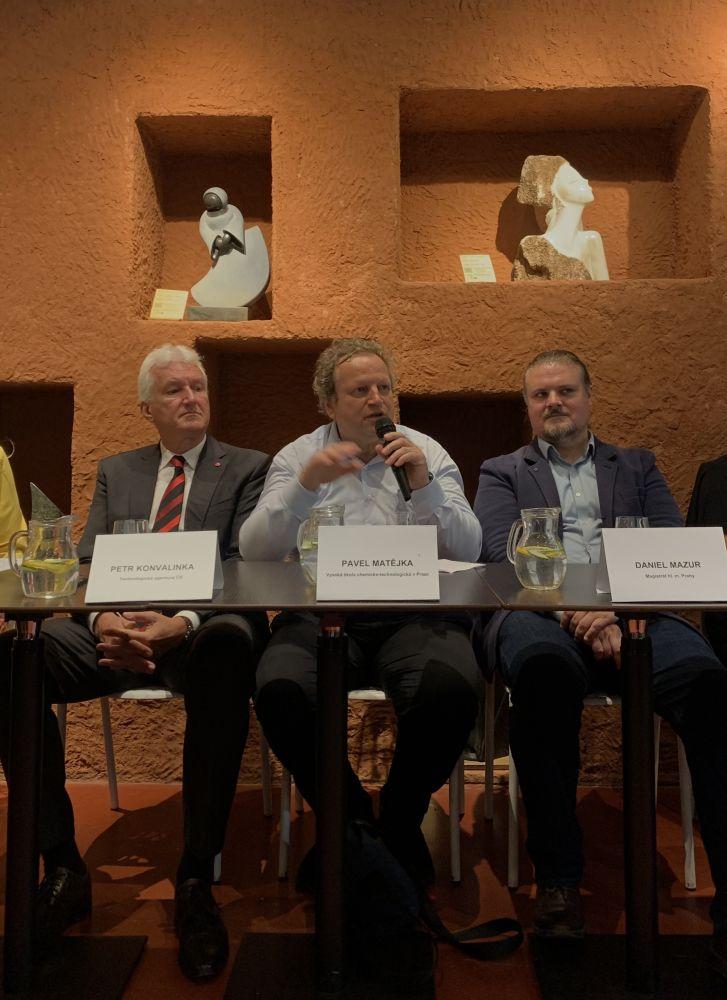
UCT Prague co-founds Prague.bio with goal of connecting research and business sectors
Prague, 5 September 2023 Prague is on the cusp of becoming a European leader in biotechnology thanks to greater collaboration between R&D institutions and commercial partners. Prague.bio, a new trade association, plans to connect the research and business sectors with the aim of accelerating the development of new drugs, diagnostics, and other innovative initiatives that will diversify Czech R&D funding streams. The association will foster a supportive environment for ground-breaking discoveries similar to the historical contributions made by Czech scientists Antonín Holý (AIDS treatment) and Otto Wichterle (soft contact lenses). UCT Prague is one of the founding members of this association.
The Prague.bio biotechnology cluster combines R&D&I activities in medicine and the life sciences and brings together key players in research, the commercial sector, potential investors, and government.
“Biotechnology in the Czech Republic shows great promise, because research here is quite excellent and we already have a number of commercially successful outputs. Biotechnology will just become more import in the future and it is a strategic pillar in the economic development in the Czech Republic, one of the main areas of innovation where we should focus,” said Czech Minister for Science and Research, Helena Langšádlová.
Her sentiments are echoed by Prague’s mayor, Bohuslav Svoboda: “Biotechnology initiatives play a strategic role in the ongoing development of Prague. Our city has a rich history, a colourful present, and I see a promising future in this area. I believe the new cluster will help strengthen the Czech position in this field.”
Daniel Mazur, Prague councillor for IT, Smart City, Science, Research, and Innovations. adds: “As councillor, I certainly agree that a biotechnology centre for R&D&I should be in Prague. Our city government clearly supports this. I believe that this centre will inspire other industries and—above all—make Prague the birthplace of even more ground-breaking discoveries, inventions, and their real-world application.”
The founding members of the association are:
- The Institute of Organic Chemistry and Biochemistry of the Czech Academy of Sciences (CAS), IOCB Prague
- i&i Prague, an IOCB subsidiary
- The CAS Institute of Biotechnology
- The CAS Institute of Microbiology
- The CAS Institute of Molecular Genetics
- The University of Chemistry and Technology, Prague (UCT Prague)
Additional academic members, companies, and investors and investors will join soon
These institutions represent the Czech Republic’s leaders in education and research who have a greatly influence the development of new drugs, diagnostic methods, and other medical technologies.
“Prague.bio’s goals include becoming the moderator for development of biotechnology in our country, to represent the Czech biotechnology industry abroad, to contribute to greater drug independence for our citizens, and to support the development of drugs that can one day change the fight against diseases worldwide,” said Jan Konvalinka, Director of IOCB Prague.
In a number of countries, such as Israel, biotechnology helps driver the national economy. Prague.bio similarly wants to fully exploit Czech biotechnology research potential. This will contribute to the national budget and make the Czech Republic more independent at a time when Czechs are dealing with pharmaceutical and healthcare innovation bottlenecks.
“Biotechnology already contributes billions of crowns to Czech R&D&I, making it one of the most successful and promising contributors to the country’s economy. However, fewer and fewer medicines are being developed here compared to Europe; the transfer of research results to the production of innovative medicines, in cooperation with large pharmaceutical companies, can improve this situation,” adds the Technology Agency of the Czech Republic’s Board Chair, Petr Konvalinka. Financing for the cluster will come from multiple sources, including member contributions, public funds, and contributions from sponsors and other partners.
In fulfilling its mission, Prague.bio wants to be inspired, among other things, by the success stories of historical Czech scientists such as Holý and Wichterle. “Today we have many smart brains and skilful hands for making discoveries with global impact. An example of this is a breakthrough in the availability of radiotherapy thanks to researchers from IOCB. We will support such projects from the original idea all the way up to final implementation. We are pleased that this cluster is supported by the City of Prague and Czech national government,” notes Jana Žaludová, cluster Director.
Pavel Matějka, UCT Prague, adds another reasons for founding the association: “Antibiotic resistance presents us with a challenging problem at this point in time. If we do not prevent further resistance, in twenty-five years, the human race will be where it was before penicillin was discovered. Such great challenges cannot be met without collaborative effort, both between research institutions and also including commercial partners and public policy makers.”
The Prague.bio biotechnological cluster welcomes all institutions involved in the development of drugs, diagnostics, and other medical technologies in the Czech Republic, be they universities, research institutes, incubators, transfer centres, start-ups, investors, industrial companies, or governmental entities.
Media contact: Martin Kovalčík, +420 777 472 863, kovalcik@iniprague.com







